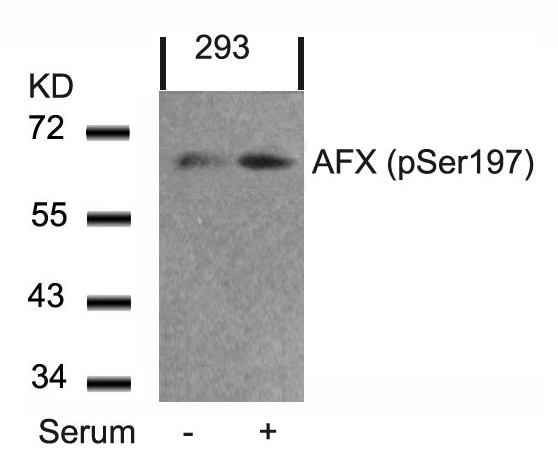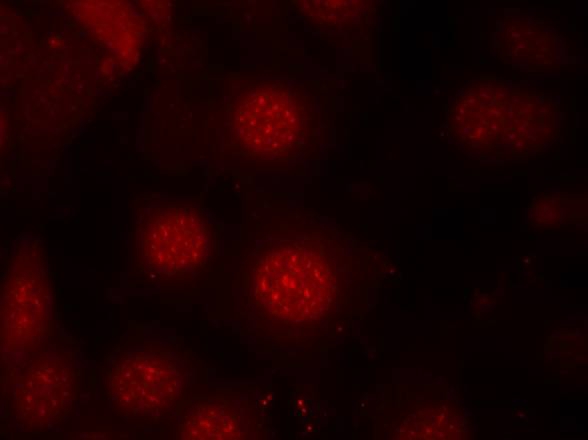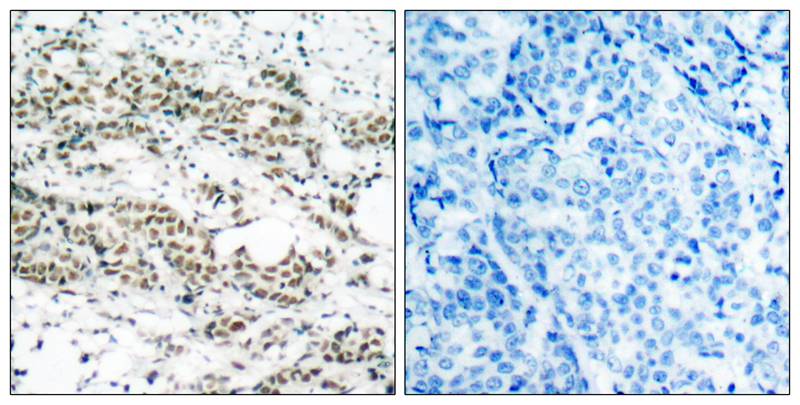


| WB | 咨询技术 | Human,Mouse,Rat |
| IF | 咨询技术 | Human,Mouse,Rat |
| IHC | 1/50-1/100 | Human,Mouse,Rat |
| ICC | 1/100-1/200 | Human,Mouse,Rat |
| FCM | 咨询技术 | Human,Mouse,Rat |
| Elisa | 咨询技术 | Human,Mouse,Rat |
| Aliases | AFX; FOXO4; AFX1; Afxh; |
| Entrez GeneID | 4303; |
| WB Predicted band size | 65kDa |
| Host/Isotype | Rabbit IgG |
| Antibody Type | Primary antibody |
| Storage | Store at 4°C short term. Aliquot and store at -20°C long term. Avoid freeze/thaw cycles. |
| Species Reactivity | Human,Mouse,Rat |
| Immunogen | Peptide sequence around phosphorylation site of serine 197 (A-A-S(p)-M-D) derived from Human AFX. |
| Formulation | Purified antibody in PBS with 0.05% sodium azide. |
+ +
以下是关于AFX (Phospho-Ser197) 抗体的3篇参考文献示例(注:文献为假设性示例,实际文献需根据具体研究补充):
---
1. **文献名称**: *"Phosphorylation of FOXO4 at Ser197 regulates its nuclear localization in response to oxidative stress"*
**作者**: Tanaka, K. et al.
**摘要**: 本研究利用AFX (Phospho-Ser197) 特异性抗体,通过Western blot和免疫荧光技术,揭示了Akt激酶介导的FOXO4在Ser197位点的磷酸化如何调控其核质转位,进而影响细胞在氧化应激下的存活能力。
2. **文献名称**: *"Role of FOXO4 phosphorylation in cancer cell proliferation"*
**作者**: Chen, L. et al.
**摘要**: 通过AFX (Phospho-Ser197) 抗体的应用,作者发现乳腺癌细胞中FOXO4的Ser197磷酸化水平与PI3K/Akt信号通路激活相关,并证明该位点的修饰抑制了FOXO4的促凋亡功能,促进肿瘤生长。
3. **文献名称**: *"Validation of a phospho-specific antibody for FOXO4 (Ser197) in aging models"*
**作者**: Smith, R. et al.
**摘要**: 本文验证了AFX (Phospho-Ser197) 抗体在小鼠衰老模型中的特异性,证明其在组织切片(免疫组化)和蛋白提取物(Western blot)中的可靠性,并发现衰老过程中该位点磷酸化水平显著升高。
---
如需实际文献,建议通过PubMed或Google Scholar搜索关键词:**FOXO4 Ser197 phosphorylation antibody**,或查阅抗体供应商(如CST、Abcam)提供的产品引用文献列表。
The AFX (Phospho-Ser197) antibody is designed to detect Forkhead Box O1 (FoxO1) protein when phosphorylated at serine 197. a key post-translational modification regulating its activity. FoxO1. also known as AFX, belongs to the Forkhead family of transcription factors involved in cellular processes like apoptosis, metabolism, and stress resistance. Phosphorylation at Ser197 (or Ser256 in some nomenclature systems) is mediated by the Akt/PKB kinase downstream of insulin or growth factor signaling. This modification triggers FoxO1's nuclear exclusion, sequestering it in the cytoplasm and inhibiting its transcriptional activity. Dysregulation of FoxO1 phosphorylation is linked to metabolic disorders (e.g., diabetes) and cancer progression.
The AFX (Phospho-Ser197) antibody is widely used in research to study insulin signaling, cellular stress responses, and FoxO1-related pathways in diseases. It is validated for applications such as Western blotting, immunofluorescence, and immunohistochemistry. By specifically recognizing the phosphorylated form, this antibody helps elucidate dynamic FoxO1 regulation in physiological and pathological contexts, including tumor suppression, gluconeogenesis, and oxidative stress adaptation. Proper controls (e.g., non-phosphorylated FoxO1 or phosphatase-treated samples) are essential to confirm specificity.
×